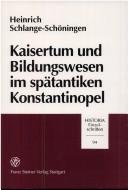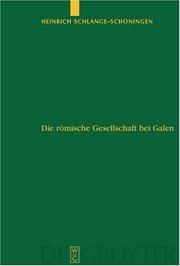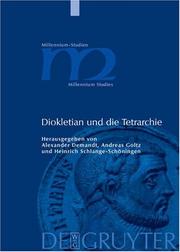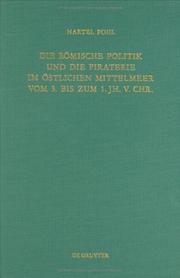| Listing 1 - 10 of 11 | << page >> |
Sort by
|

ISBN: 3515067604 9783515067607 Year: 1995 Volume: 94 Publisher: Stuttgart Steiner
Abstract | Keywords | Export | Availability | Bookmark
 Loading...
Loading...Choose an application
- Reference Manager
- EndNote
- RefWorks (Direct export to RefWorks)
Roman history --- Istanbul [city] --- Education --- Enseignement --- Istanbul (Turkey) --- Rome --- Istanbul (Turquie) --- History --- Histoire --- -Education --- -Children --- Education, Primitive --- Education of children --- Human resource development --- Instruction --- Pedagogy --- Schooling --- Students --- Youth --- Civilization --- Learning and scholarship --- Mental discipline --- Schools --- Teaching --- Training --- -Rome --- History. --- -Istanbul (Turkey) --- Children --- Education - Rome. --- Education - Turkey - Istanbul --- Empire byzantin --- Civilisation

ISBN: 3110178508 3110894017 9783110178500 Year: 2003 Volume: Bd. 65 Publisher: Berlin ; New York : De Gruyter,
Abstract | Keywords | Export | Availability | Bookmark
 Loading...
Loading...Choose an application
- Reference Manager
- EndNote
- RefWorks (Direct export to RefWorks)
Galen hat als Gladiatorenarzt in Pergamon, als Freund etlicher Mitglieder der römischen Oberschicht und als Hausarzt der Kaiser in Rom die Lebensbedingungen aller Schichten der römischen Gesellschaft des 2. Jahrhunderts n. Chr. kennen gelernt. Die vorliegende Arbeit unternimmt erstmals eine Auswertung des gesamten Corpus Galenicum für die Sozialgeschichte der römischen Kaiserzeit. Dabei wird die besondere Perspektive berücksichtigt, die sich aus Galens Herkunft und Laufbahn sowie der Motivation seiner Schriften ergibt. Die Darstellung folgt zunächst der Biographie Galens, bietet aber auch übergreifende Kapitel, z. B. zur Sklaverei. Galen, as gladiator doctor in Pergamum, friend of several members of the Roman upper class, and family physician of the emperors in Rome, was well acquainted with the living conditions of all strata of Roman society of the second century A.D. For the first time, in this book all of Galen's writings are analyzed as a contribution to the social history of the Roman Empire. The author considers the special perspective offered by Galen's background, career, and motives for writing. The material is presented first following Galen's biography; the study then branches out to chapters on slavery and other overarching aspects of the world Galen knew.
Medicine, Greek and Roman --- Greek medicine --- Medicine, Roman --- Medicine, Unani --- Roman medicine --- Tibb (Medicine) --- Unani medicine --- Unani-Tibb (Medicine) --- Medicine, Ancient --- Galen. --- Galenus --- Galen, Claudius --- Galenus, Claudius --- Galen, --- Galénos --- Galeno --- Galen, Klavdiĭ --- Galinus --- Galiʼenus --- Galiʼeno --- Galiʼenu --- Galien, --- Galeno, Claudio --- جالينوس --- Γαλῆνος --- Galênós, --- Pseudo-Galenus --- Rome --- History --- Medicine, Greek and Roman. --- Médecine grecque et romaine --- Histoire --- Claudius Galenus --- Galen --- Galien, Claude --- Galeni
Book
ISBN: 9783805351522 9783805351492 3805351496 Year: 2018 Publisher: Darmstadt WBG (Wissenschaftliche Buchgesellschaft)
Abstract | Keywords | Export | Availability | Bookmark
 Loading...
Loading...Choose an application
- Reference Manager
- EndNote
- RefWorks (Direct export to RefWorks)
Hieronymus kannte das Römische Reich besser als die meisten seiner Zeitgenossen: Er lebte die erste Hälfte seines langen Lebens vorwiegend im Westen, die zweite Hälfte dann im Osten, wo er als Begründer und Vorsteher eines Klosters in Bethlehem großen Einfluss auf die Kirche gewonnen hat. Sein größtes Werk war die lateinische Übersetzung der Bibel, seine Theologie verbreitete er aber auch durch Briefe, Abhandlungen und Kommentare. Als Asket und Mönch hat er seine strenge christliche Morallehre selbst gelebt und sich als Theologe sehr polemisch mit häretischen Lehren auseinandergesetzt. Hoch gebildet auch in der heidnischen Literatur, fühlte sich Hieronymus als Christ und Römer; der sichtbare Verfall des Imperiums erschütterte ihn schwer. Heinrich Schlange-Schöningen beschreibt eindrucksvoll das Leben dieses einflussreichen Kirchenvaters und führt uns dabei auch das Nachwirken, vor allem in der Kunst, vor Augen. Biographische Informationen Heinrich Schlange-Schöningen, geb. 1960, studierte Geschichte, Religionswissenschaft und Philosophie in Berlin und Bordeaux. Er ist Professor für Alte Geschichte an der Universität des Saarlandes in Saarbrücken. Er forscht v.a. zur Religions-, Kultur- und Sozialgeschichte der Kaiserzeit und der Spätantike. Der Althistoriker und Theologe Manfred Clauss war bis zu seiner Emeritierung Professor für Alte Geschichte an der Johann-Wolfgang-Goethe-Universität Frankfurt. Bei der WBG ist er Mitherausgeber der Reihe ›Historische Biografien‹. In jüngerer Zeit erschien von ihm u.a. ›Alexandria. Biographie einer Weltstadt‹ (2003) und ›Mithras. Kult und Mysterium‹ (2012).
Book
ISBN: 3534165128 Year: 2005 Publisher: Darmstadt Wissenschaftliche Buchgesellschaft
Abstract | Keywords | Export | Availability | Bookmark
 Loading...
Loading...Choose an application
- Reference Manager
- EndNote
- RefWorks (Direct export to RefWorks)
Book
ISBN: 9783534207787 Year: 2007 Publisher: Darmstadt Wissenschaftliche Buchgesellschaft
Abstract | Keywords | Export | Availability | Bookmark
 Loading...
Loading...Choose an application
- Reference Manager
- EndNote
- RefWorks (Direct export to RefWorks)
Book
ISBN: 9783412201920 3412201928 Year: 2008 Volume: 66 Publisher: Köln : Böhlau,
Abstract | Keywords | Export | Availability | Bookmark
 Loading...
Loading...Choose an application
- Reference Manager
- EndNote
- RefWorks (Direct export to RefWorks)
Constantine --- Congresses. --- Rome --- History --- Histoire --- Congrès --- Congrès --- Constantin empereur

ISBN: 3110182300 3110914603 Year: 2012 Volume: 1 Publisher: Berlin/Boston De Gruyter
Abstract | Keywords | Export | Availability | Bookmark
 Loading...
Loading...Choose an application
- Reference Manager
- EndNote
- RefWorks (Direct export to RefWorks)
"As a statesman a genius of the first order" was Theodor Mommsen's verdict in 1886 on Diocletian, the Dalmatian whose career took him from a released slave to Emperor. Diocletian stabilised the Imperium after it had been thrown into turmoil in the imperial crisis of the period of military anarchy. After his abdication in 305, he retired to the magnificent palace of Spalato (Split, Croatia) built for his old age. Although his arrangements for the succession, his price controls and his anti-Christian policies were not a lasting success, his comprehensive reforms created the basis for Constantine and the transition to the Late Classical Age. Renowned scholars from Germany, Great Britain, Croatia, Slovenia and Switzerland contributed to an international conference held in Split in 2003. Their papers collected here show the present state of research on the Tetrarchy in its political, social, economic, ideological, historico-religious and archaeological aspects and on the reception of Diocletian up to modern times. "Ein staatsmännisches Genie ersten Ranges", so nannte Theodor Mommsen 1886 Diokletian, jenen Dalmatiner, der es vom Freigelassenen bis zum Kaiser gebracht hatte. Diokletian hat das in der Reichskrise der Soldatenkaiserzeit zerrüttete Imperium wieder stabilisiert und sich nach seiner Abdankung 305 in den großartigen Alterspalast Spalato (Split, Kroatien) zurückgezogen. Wenn er auch mit seiner Nachfolgeregelung, seiner Preiskontrolle und seiner christenfeindlichen Politik keinen dauerhaften Erfolg hatte, so boten doch seine umfassenden Reformen die Voraussetzungen für Constantin und den Übergang in die Spätantike. Die hier vorgelegten Beiträge der 2003 in Split durchgeführten internationalen Tagung namhafter Gelehrter aus Deutschland, Großbritannien, Kroatien, Slowenien und der Schweiz präsentieren die Forschungslage zur Tetrarchie, zu ihren politischen, sozialen, ökonomischen, ideologischen, religionshistorischen und archäologischen Aspekten sowie zur Rezeption Diokletians bis in die Neuzeit.
Diocletian, --- Diocletianus, --- Dioklecijan, --- Diokletian, --- Diokghetianos, --- Diocleziano, --- Diocleciano, --- Cayo Aurelio Valerio Diocleciano, --- Rome --- Rim --- Roman Empire --- Roman Republic (510-30 B.C.) --- Romi (Empire) --- Byzantine Empire --- Rome (Italy) --- History --- Diocletian, Emperor of Rome --- Congresses --- Diocletian, 284-305 --- Empire, 284-476 --- Diokletian. --- Rezeption. --- Tetrarchie. --- HISTORY / Ancient / General. --- Tetrarchy --- Diocletian
Book
ISBN: 9783412525187 3412525189 3412525200 Year: 2022 Publisher: Wien Böhlau Verlag
Abstract | Keywords | Export | Availability | Bookmark
 Loading...
Loading...Choose an application
- Reference Manager
- EndNote
- RefWorks (Direct export to RefWorks)
(Produktform)Hardback --- Christianisierung --- Alexander Demandt --- Antike Sklaverei --- Konstantin der Große --- Justinian --- Diokletian --- Spätantike --- Diocletian, --- Constantine --- Constantijn, --- Constantin, --- Constantin --- Constantine, --- Constantino --- Constantinus Flavius Valerius Aurelius, --- Constantinus --- Constantinus, --- Costantino --- Costantino, --- Flaviĭ Valeriĭ Avreliĭ Konstantin, --- Flavius Valerius Aurelius Constantinus Augustus, --- Flavius Valerius Aurelius Constantinus, --- Flavius Valerius Constantinus, --- Konstantin, --- Konstantin --- Kōnstantinos, --- Kōnstantinos --- Konstantyn, --- Kostandianos --- Κωνσταντίνος, --- Флавий Валерий Аврелий Константин, --- Константин --- Константин, --- Flavije Valerije Konstantin --- Diocletianus, --- Dioklecijan, --- Diokletian, --- Diokghetianos, --- Diocleziano, --- Diocleciano, --- Cayo Aurelio Valerio Diocleciano, --- Rome --- Europe --- History

ISBN: 9783110177664 Year: 2005 Publisher: Berlin de Gruyter
Abstract | Keywords | Export | Availability | Bookmark
 Loading...
Loading...Choose an application
- Reference Manager
- EndNote
- RefWorks (Direct export to RefWorks)
Mommsen, Theodor, --- Germany --- Germany --- Historiography --- History --- Politics and government
Book
ISBN: 2763745199 9782763745190 9782763745183 Year: 2020 Publisher: Quebec
Abstract | Keywords | Export | Availability | Bookmark
 Loading...
Loading...Choose an application
- Reference Manager
- EndNote
- RefWorks (Direct export to RefWorks)
L’un des aspects les plus intrigants de l’œuvre de Michel Foucault réside dans son intérêt tardif pour la pensée antique, plus spécialement pour la culture grecque et son héritage romain qu’on peut faire remonter à ses recherches ayant mené, à partir de 1976, à son Histoire de la sexualité. Du fait même de l’infléchissement que connut alors sa pensée, Foucault fut à même d’établir des liens à tous égards originaux et même surprenants entre la pensée antique et la réflexion moderne. En le lisant, c’est une tradition de près de 2500 ans qui s’offre désormais à notre regard. Que nous apprend, sur notre histoire, le fait de mettre en parallèle les propos de Socrate et ceux de Kant ? À quoi peut servir l’interrogation menée sur la sexualité antique, si ce n’est peut-être à la « dépsychologiser », la « dépathologiser », la « détaxonomiser », et ainsi la « désenclaver » de ses classifications ultérieures ? Que nous enseigne le fait d’entendre par « modernité » non plus une « époque » particulière de l’histoire, mais une manière d’être des individus, une certaine attitude adoptée, « ce que les Grecs, souligne Foucault, appelaient un ‘éthos’ » ? De quelle manière, finalement, l’esprit critique moderne s’éclaire-t-il de l’esprit critique antique ? Les études ici rassemblées posent ces questions à Foucault, avec Foucault et parfois aussi contre Foucault, en écho toujours à ce « courage de la vérité » dont il incarna si splendidement l’exemple.
| Listing 1 - 10 of 11 | << page >> |
Sort by
|

 Search
Search Feedback
Feedback About UniCat
About UniCat  Help
Help News
News